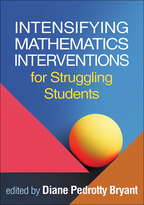Intensifying Mathematics Interventions for Struggling Students
Edited by Diane Pedrotty Bryant
HardcoverPaperbacke-bookprint + e-book
Hardcover
orderJuly 5, 2021
ISBN 9781462546206
Price: $54.00 209 Pages
Size: 7" x 10"
Paperback
orderJuly 5, 2021
ISBN 9781462546190
Price: $36.00 209 Pages
Size: 7" x 10"
e-book
orderMay 19, 2021
PDF and Accessible ePub ?
Price: $36.00 209 Pages
ePub is Global Certified Accessible
print + e-book $72.00 $43.20
orderPaperback + e-Book (PDF and Accessible ePub) ?
Price: 209 Pages
ePub is Global Certified Accessible
The reproducible materials can be downloaded and printed in PDF format.
“This book is exactly what teachers and teacher educators need! The explanations of complex instructional and assessment techniques, examples, and case studies make it easy to understand classroom implementation. I will definitely use this book as a text in my undergraduate Mathematics Methods course.”

—Mary Beth Calhoon, PhD, Department of Teaching and Learning, University of Miami
“Contributors include the most prominent researchers in the field of math education. Each chapter is well researched and is applicable to designing effective instruction. The book is chock-full of evidence-based information related to intensifying interventions for students having serious difficulties in math. Chapters provide clear guidance to practitioners as well as researchers. This is a critical work for those interested in enhancing math performance among students who find math difficult to master.”

—H. Lee Swanson, PhD, Distinguished Professor Emeritus of Educational Psychology, University of California, Riverside; Research Professor, University of New Mexico
“This comprehensive book can serve as an introduction for preservice teachers and a resource for practicing teachers. It provides a thorough presentation of mathematics standards and approaches to intensifying instruction. Across foundational and critical concepts, the book offers interventions that foster higher-level mathematical thinking. The discussions of mathematical language and 'rules that expire' will help teachers avoid inadvertently instilling misconceptions and compounding students’ struggles.”

—Margaret M. Flores, PhD, Department of Special Education, Rehabilitation, and Counseling, Auburn University
—Mary Beth Calhoon, PhD, Department of Teaching and Learning, University of Miami
“Contributors include the most prominent researchers in the field of math education. Each chapter is well researched and is applicable to designing effective instruction. The book is chock-full of evidence-based information related to intensifying interventions for students having serious difficulties in math. Chapters provide clear guidance to practitioners as well as researchers. This is a critical work for those interested in enhancing math performance among students who find math difficult to master.”
—H. Lee Swanson, PhD, Distinguished Professor Emeritus of Educational Psychology, University of California, Riverside; Research Professor, University of New Mexico
“This comprehensive book can serve as an introduction for preservice teachers and a resource for practicing teachers. It provides a thorough presentation of mathematics standards and approaches to intensifying instruction. Across foundational and critical concepts, the book offers interventions that foster higher-level mathematical thinking. The discussions of mathematical language and 'rules that expire' will help teachers avoid inadvertently instilling misconceptions and compounding students’ struggles.”
—Margaret M. Flores, PhD, Department of Special Education, Rehabilitation, and Counseling, Auburn University



